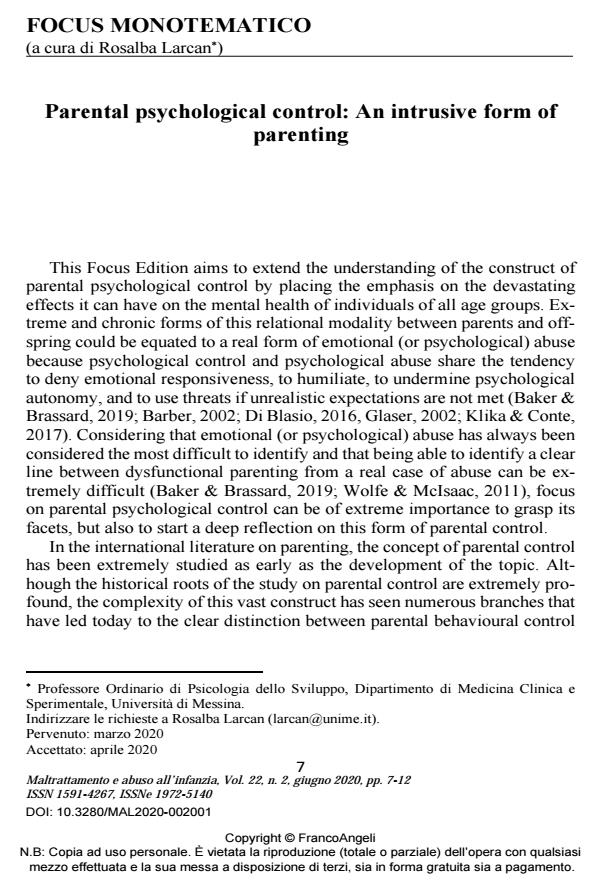Parental psychological control: An intrusive form of parenting
Journal title MALTRATTAMENTO E ABUSO ALL’INFANZIA
Author/s Rosalba Larcan
Publishing Year 2020 Issue 2020/2 Language English
Pages 6 P. 7-12 File size 175 KB
DOI 10.3280/MAL2020-002001
DOI is like a bar code for intellectual property: to have more infomation
click here
Below, you can see the article first page
If you want to buy this article in PDF format, you can do it, following the instructions to buy download credits

FrancoAngeli is member of Publishers International Linking Association, Inc (PILA), a not-for-profit association which run the CrossRef service enabling links to and from online scholarly content.
- Baker, A. J., & Brassard, M. (2019). Predictors of variation in sate reported rates of psychological maltreatment: A survey of statutes and a call for change. Child abuse & neglect, 96, 104-102.
- Barber, B. K. (1992). Family, personality, and adolescent problem behaviors. Journal of Marriage and the Family, 69-79. DOI: 10.2307/353276
- Barber, B. K. (1996). Parental psychological control: Revisiting a neglected construct. Child development, 67(6), 3296-3319,
- Barber, B. K. (2002). Intrusive parenting: How psychological control affects children and adolescents (pp. xv-309). American Psychological Association.
- Barber, B. K., & Harmon, E. L. (2002). Violating the self: Parental psychological control of children and adolescents. In B. K. Barber (Ed.), Intrusive parenting: How psychological control affects children and adolescents (p. 15-52). American Psychological Association, DOI: 10.1037/10422-002
- Di Blasio, P. (2016). Forme di violenza e conseguenze psicologiche. Maltrattamento e Abuso all’Infanzia, 18(2), 4-15, DOI: 10.3280/MAL2016-S02001
- Dishion, T. J., & McMahon, R. J. (1998). Parental monitoring and the prevention of child and adolescent problem behavior: A conceptual and empirical formulation. Clinical child and family psychology review, 1(1), 61-75, DOI: 10.1023/A:1021800432380
- Fortson, B. L., Klevens, J., Merrick, M. T., Gilbert, L. K., & Alexander, S. P. (2016). Preventing child abuse and neglect: A technical package for policy, norm, and programmatic activities. Atlanta, GA: National Center for Injury Prevention and Control, Centers for Disease Control and Prevention.
- Glaser, D. (2002). Emotional abuse and neglect (psychological maltreatment): A conceptual framework. Child Abuse & Neglect, 26(6-7), 697-714,
- Grolnick, W. S. (2003). The psychology of parental control: How well-meant parenting backfires. New York: Psychology Press.
- MacKinnon, D. W. (1938). Violation of prohibitions. In H. A. Murray (Ed.), Explorations in personality: A clinical and experimental study of fifty men of college age (pp. 491- 501). New York: Oxford University Press.
- Ryan, R. M., & Deci, E. L. (2017). Self-determination theory: Basic psychological needs in motivation, development, and wellness. New York: Guilford Publications.
- Schaefer, E. S. (1959). A circumplex model for maternal behavior. Journal of Abnormal and Social Psychology, 59, 226-235,
- Schaefer, E. S. (1965a). Children’s reports of parental behavior: An inventory. Child Development, 36, 413-424, DOI: 10.2307/1126465
- Schaefer, E. S. (1965b). A configurational analysis of children’s reports of parent behavior. Journal of Consulting Psychology, 29, 552-557,
- Scharf, M., & Goldner, L. (2018). “If you really love me, you will do/be…”: Parental psychological control and its implications for children’s adjustment. Developmental Review, 49, 16-30,
- Soenens, B., & Vansteenkiste, M. (2010). A theoretical upgrade of the concept of parental psychological control: Proposing new insights on the basis of self-determination theory. Developmental Review, 30(1), 74-99,
- Stattin, H., & Kerr, M. (2000). Parental monitoring: A reinterpretation. Child development, 71(4), 1072-1085, DOI: 10.1111/1467-8624.00210
- Steinberg, L. (1990). Autonomy, conflict, and harmony in the family relationship. In S. S. Feldman & G. R. Elliott (Eds.), At the threshold: The developing adolescent (p. 255-276). Harvard University Press.
- Symeou, M., & Georgiou, S. (2017). Externalizing and internalizing behaviours in adolescence, and the importance of parental behavioural and psychological control practices. Journal of adolescence, 60, 104-113,
- Valtolina, G. G. (2013). Contesto culturale, controllo genitoriale e punizioni fisiche. Maltrattamento e Abuso all’Infanzia, 15(1), 11-25, DOI: 10.3280/MAL2013-001002
- Vansteenkiste, M., & Ryan, R. M. (2013). On psychological growth and vulnerability: Basic psychological need satisfaction and need frustration as a unifying principle. Journal of psychotherapy integration, 23(3), 263,
- Verrocchio, M. C. (2014). Il maltrattamento psicologico: caratteristiche e conseguenze. Maltrattamento e Abuso all’Infanzia, 16(1), 11-35, DOI: 10.3280/MAL2014-001002
- Wolfe, D. A., & McIsaac, C. (2011). Distinguishing between poor/dysfunctional parenting and child emotional maltreatment. Child Abuse & Neglect, 35(10), 802-813,
- Dallo stress economico al malessere psicologico dei minori durante la pandemia da Covid-19: quale ruolo per il conflitto co-genitoriale e le pratiche educative autoritarie? Elena Camisasca, Venusia Covelli, Sarah Miragoli, in MALTRATTAMENTO E ABUSO ALL'INFANZIA 1/2021 pp.13
DOI: 10.3280/MAL2021-001002
Rosalba Larcan, Parental psychological control: An intrusive form of parenting in "MALTRATTAMENTO E ABUSO ALL’INFANZIA" 2/2020, pp 7-12, DOI: 10.3280/MAL2020-002001